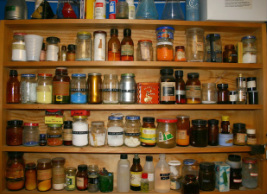 The world today is full of toxins and chemicals. There have been reports based on data collected that in every human being alive, no matter where they live, they have at minimum over 250 chemicals in their tissues. That’s a lot of chemicals, and that’s supposed to be the conservative estimate. Why do toxins matter? The amount of toxins we are exposed to matters, because our toxic load can have a very profound effect on the physiology of our body. Noticed how more children are being diagnosed with ADD/ADHD? Studies show 82% of children are exposed every week to one or more ingredients with the potential to harm the brain and nervous system (EWG, 2013). If you harm the brain and the nervous system, there is going to be a change in a child’s behavior and their ability to focus. These effects can be more pronounced in children because their bodies are developing and growing, but this does not mean that adults are unaffected by these levels of chemicals. Thyroid dysfunction and disease for example has become more common, particularly in women. According to a 2006 report by the National Academy of Sciences/National Research Council (NAS/NRC) fluoride was identified as a potent hormone disruptor that may affect normal thyroid function. The potency of fluoride is illustrated by the fact that until the 1970s, European doctors used fluoride as a thyroid-suppressing medication for patients with over active thyroid (hyperthyroidism). Today, people living in communities with fluoridated tap water are ingesting doses of fluoride that fall within the range of doses once used by doctors to reduce thyroid activity in hyperthyroid patients (NRC 2006). Almost every system in our body can be affected by chemicals. Other common conditions that have links to toxin levels include:
What can we do?
This may sound like a hopeless situation that we can do nothing about, but that simply is not true. Even one person, has the ability to change the world around them. The following are some suggestions for making a difference: 1. Eat Organic The power of your purchases makes a bigger difference than you think. When you make the choice to buy organic, you’re sending the message that your health is important to you and you want things to change. The more people there are making this kind of stand, shows the policy makers that organic and toxins is an issue people care about so they should too if they want to get elected to office. If budget is a concern, look for the deals and prioritizing your organics. Look at the Environmental Working Group’s Clean 15 and Dirty Dozen list as a starting point: http://www.ewg.org/foodnews/. 2. Use Environmentally Friendly Products There are many commercially available products that use no chemicals in their cleaning products. Consider replacing your soap, cleaners, and laundry detergent with more environmentally friendly counterparts. It's also easy to make your own, and there are many recipes easily available online using ingredients you probably already have in your cupboard. 3. Check Your Cosmetics/Personal Hygiene Products Many cosmetics and personal grooming products have all kinds of chemicals and toxins as their ingredients. Look at the labels on your products and consider buying from sources that do not use these chemicals. Environmental Working Group is a good source for checking your cosmetic products for dangerous chemicals. 4. Petition Your local Government Representative Things don’t change unless we indicate to our government officials that an issue is important to the public at large. If you want to see Canada making tougher policies on how much pesticides and chemicals can be used on your food and in your products, you have to make sure that your local representative knows about it. Whether it’s writing a letter or organizing an event, just standing by and waiting for someone else to do something is not going to make a change. Resources: Environmental Working Group. 2013. Dirty Dozen Endocrine Disruptors. www.ewg.org/research/ dirty-dozen-list-endocrine-disruptors. National Research Council. 2006. Fluoride in Drinking Water: A Scientific Review of the EPA’s Standards. http://www.nap.edu/catalog.php?record_id=11571
0 Comments
Leave a Reply. |
Sarah Connors
I am a Naturopathic Doctor and Doula providing care in the Kitchener-Waterloo area. I have a passion for helping people with their health issues and improving the birth experience for Moms, and their babies. I also have a life long love affair with soccer, curling, and the alto saxophone. Archives
November 2020
Categories
All
|
Photos from Rural Royalty, manu flickr2010, Ryan Dickey, wocintechchat, huskyte77, paulswansen, Black Room Photography, harum.koh, Emery Co Photo, JeepersMedia, BrownGuacamole, wellnesswildflower, JeepersMedia, vastateparksstaff, colindunn, seelensturm, /\ \/\/ /\, 50mm.za, The Simpsons (Lee, Shirley, Luke and Rachel), AGRONAUTI, aivas14, Jonathan Rolande, winnifredxoxo, juhansonin, osseous, nan palmero, Theo Crazzolara, brianfagan, TP studio, wuestenigel, torbakhopper, anka.albrecht, Michael Stern, [-ChristiaN-], franchiseopportunitiesphotos, terren in Virginia, nateOne, barnimages.com, Dun.can, wuestenigel, @lattefarsan, amandabhslater, aphrodite-in-nyc, nutritionaldoublethink, Anne Worner, donnierayjones, mikecogh, angeloangelo, Rob.Bertholf, getaiwan, Lida Rose, matsuyuki, SurFeRGiRL30, marcoverch, amsfrank, mdaltry, nutrition education, Mike Prince, Edsel L, Neighborhood Nini, philipp.alexander.ernst, Mediocre2010, homethods, quinn.anya, Gamma Man, katerha, Eric Kilby, National Institutes of Health (NIH), rcmd_cfdfw_5_2, curtis palmer, Ray in Manila, frankieleon, Airsoftpal.com, byzantiumbooks, cchana, Brian Legate, Matt Lavin, BradHinton, monpetitchouphotography, wuestenigel, alexisjordanlewis, ByEPhotos, erix!, RLHyde, return the sun, quinn.anya, mliu92, frankieleon, loudista, Lyn Lomasi, upslon, derrickbrutel, cchana, National Institutes of Health (NIH), watts_photos, marcoverch, derrickbrutel, francesbean, weegeebored, Airsoftpal.com, Etwood, wu_135, shixart1985, Ingrid Taylar, VeritasFotografie, BioDivLibrary, emmanuelmorales1, Thanks for 1.5 Million Views!!, Will Merydith, reader of the pack, RoxyHobbs, Khanelle Prod' Medias, storyvillegirl, agromonitor, Arenamontanus, six:eleven, cote, SweetOnVeg, nenoirenediaz, lucianvenutian, markhillary, anotherlunch.com, inkknife_2000, archibald jude, rawtrigger, Imaginary Museum Projects: News Tableaus, Pavel P., Courtney Emery, Thien Gretchen, physiognomist, bark, Michigan Municipal League (MML), alberth2, Merelymel13, neofob, Care_SMC, Parker Knight, B*2
 RSS Feed
RSS Feed
